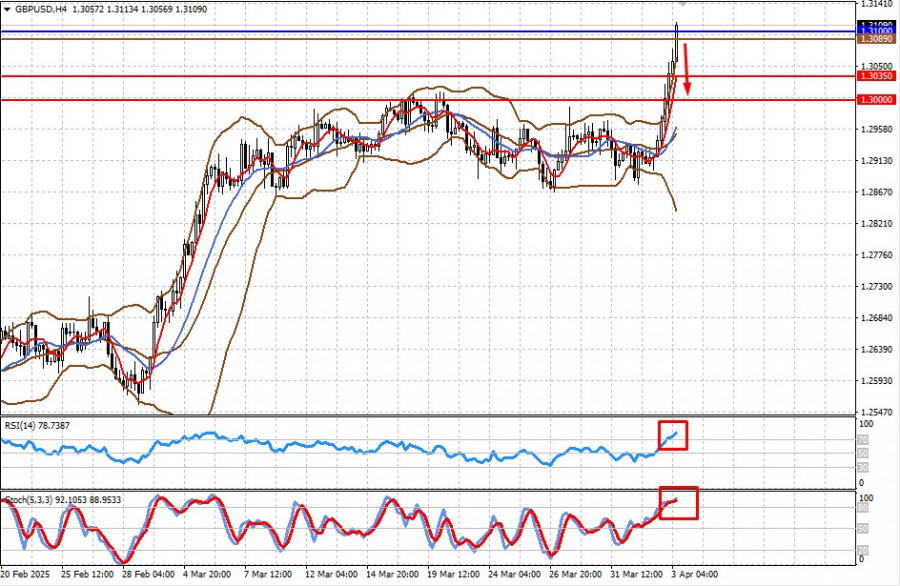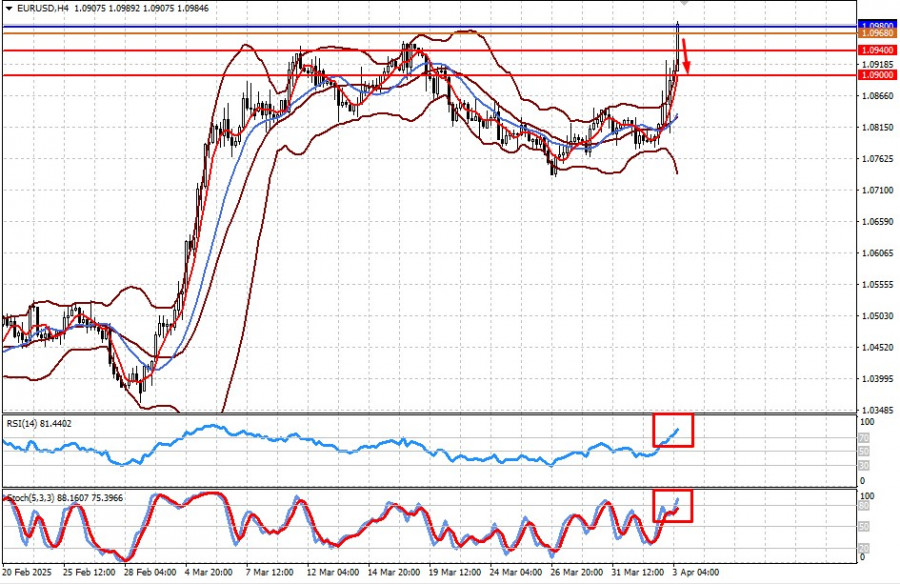Lihat juga


 03.04.2025 09:12 AM
03.04.2025 09:12 AMThe U.S. dollar had recently managed to stay above the key 104.00 mark on the ICE index, giving hope that a further decline might be avoided. But why did it tumble against other major currencies, especially considering that trade tariffs should also negatively impact the countries targeted by them?
Yes, this might seem odd at first glance, but there are clear reasons behind it, and they are likely to continue weighing on the dollar until the situation stabilizes.
As stated in a previous article, had Trump not introduced anything beyond the initially announced tariffs, the dollar might have received noticeable support yesterday. But that didn't happen. Instead, the U.S. president went beyond previously priced-in measures on the Forex market, equity indices, and Treasury yields. In addition to a base tariff of 10%—a more moderate figure than the previously floated 20%, which would have been seen as a positive—he announced additional tariffs for certain countries. According to Evercore ISI, the new weighted average tariff rate may rise to 29% after all new tariffs are implemented, the highest in over a century. This means that, collectively, the U.S. is imposing significantly higher trade barriers than initially expected.
Fears of a full-blown economic crisis and recession in the U.S. have driven investors into Treasuries, causing yields to plunge and adding downward pressure on the dollar. This decline in the Forex market is not due to strength in other currencies but rather the dollar's weakness. For example, the euro's rise contradicts the eurozone's economic issues. According to recent data, declining inflation raises the likelihood of further interest rate cuts—clearly a bearish factor for the euro versus the dollar, which might eventually find support on expectations of rate hikes if inflation picks up later this year.
In short, the dollar's drop is mostly an emotional reaction. This decline may be short-lived, ending once there's more clarity on the actual U.S. tariff rates and the retaliatory measures from trade partners. As mentioned above, fear of the unknown is pushing the dollar down. However, this decline could benefit the U.S., as it improves the competitiveness of American exports, which could strengthen the economy in the long run. In the meantime, speculators will likely take full advantage of the "tariff reality" before entering the market again at lower, more favorable price levels.
The pair is trading above the 1.3100 level. If it fails to hold above this mark, a pullback toward 1.3035 and then 1.3000 is likely.
The pair is trading above the 1.0880 level. If it fails to stay above this level, a downward correction toward 1.0940 and then 1.0900 is possible.
You have already liked this post today
*Analisis pasar yang diposting disini dimaksudkan untuk meningkatkan pengetahuan Anda namun tidak untuk memberi instruksi trading.
Pada hari Jumat, pasangan mata uang EUR/USD diperdagangkan dengan sedikit penurunan, dan volatilitas secara keseluruhan telah menurun setelah "April yang mencengangkan". Dolar AS telah menguat selama lebih dari sebulan, meskipun
Seperti yang telah menjadi kebiasaan dalam beberapa bulan terakhir, latar belakang berita ekonomi memberikan pengaruh yang sangat kecil pada instrumen keuangan. Donald Trump dan kebijakan perdagangannya tetap menjadi penggerak utama
USD/JPY. Analisis dan Prakiraan
Laporan PDB yang diterbitkan pada hari Kamis mengungkapkan bahwa ekonomi Jepang menyusut sebesar 0,7% year-over-year pada kuartal pertama—penurunan tahunan pertama dalam setahun terakhir dan jauh lebih buruk daripada yang diperkirakan
Pasar telah sepenuhnya memperhitungkan hasil pembicaraan antara AS dan Tiongkok, yang menghasilkan gencatan perdagangan selama 90 hari. Data ekonomi AS yang lebih lemah dari perkiraan mengimbangi optimisme di awal minggu
Hanya sedikit peristiwa makroekonomi yang dijadwalkan pada hari Jumat, dan tidak lebih signifikan daripada laporan yang dirilis pada hari Kamis, yang tidak memicu reaksi pasar. Pada dasarnya, satu-satunya peristiwa penting
Your IP address shows that you are currently located in the USA. If you are a resident of the United States, you are prohibited from using the services of InstaFintech Group including online trading, online transfers, deposit/withdrawal of funds, etc.
If you think you are seeing this message by mistake and your location is not the US, kindly proceed to the website. Otherwise, you must leave the website in order to comply with government restrictions.
Why does your IP address show your location as the USA?
Please confirm whether you are a US resident or not by clicking the relevant button below. If you choose the wrong option, being a US resident, you will not be able to open an account with InstaTrade anyway.
We are sorry for any inconvenience caused by this message.


